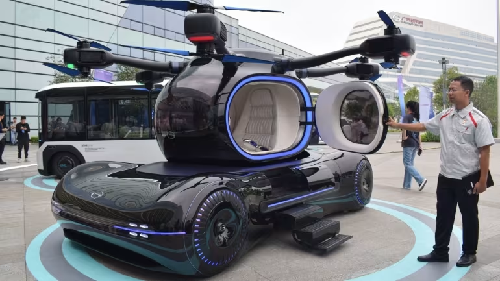The race for the skies is heating up, and Chinese tech companies are at the forefront, rapidly developing and testing electric flying vehicles. While the term “flying car” might still sound like science fiction, companies in China are making significant strides in turning this concept into a reality, with some even gaining regulatory approval for test flights.
One of the most notable players is XPENG AEROHT, a subsidiary of the electric vehicle giant XPeng. Their “Land Aircraft Carrier” is a modular flying car that combines a six-wheeled ground vehicle with a two-seat passenger drone. The vehicle’s air module can detach for vertical takeoff, allowing the pilot to bypass traffic by taking to the air. The company has announced plans to begin mass production by 2026 at a new manufacturing base with a capacity of up to 10,000 units per year.
Another major Chinese automaker, GAC Group, unveiled its own modular flying vehicle concept, the GOVE, in 2023. The GOVE is designed as a single-seat pod that can attach to a four-wheeled chassis for ground travel. What makes the GOVE unique is the remote-controlled chassis, which can be sent to a charging station while the passenger pod is in flight. While still a prototype, the company has successfully completed over 400 flight tests and is working towards commercialization.
These developments are part of a broader push in China to develop a “low-altitude economy,” which includes not only flying cars but also drone delivery services and air taxis. Cities like Shenzhen and Guangzhou are becoming hubs for this innovation, with local governments actively supporting test flights and infrastructure development. The Chinese government has also incorporated the low-altitude economy into its national growth plan, signaling a clear commitment to this emerging sector.
Other key players in the space include:
- EHang Holdings: A pioneer in autonomous aerial vehicles (AAVs) that has already received a Type Certificate from the Civil Aviation Administration of China for its EH216-S aircraft.
- AutoFlight: The company’s “Prosperity I” eVTOL became the first to complete a cross-sea intercity flight between Shenzhen and Zhuhai, cutting a two-hour car journey down to just 20 minutes.
While challenges like regulatory frameworks, battery technology, and public acceptance remain, China’s aggressive investment and rapid innovation in this field suggest that the future of personal air mobility may arrive sooner than many expect.







